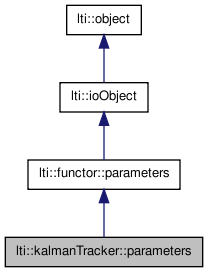

|
latest version v1.9 - last update 10 Apr 2010 |
|
The parameters for the class kalmanTracker. More...
#include <ltiKalmanTracker.h>


Public Member Functions | |
| parameters (const int &stateDimensions=4) | |
| parameters (const parameters &other) | |
| ~parameters () | |
| const char * | getTypeName () const |
| parameters & | copy (const parameters &other) |
| parameters & | operator= (const parameters &other) |
| virtual lti::functor::parameters * | clone () const |
| virtual bool | read (ioHandler &handler, const bool complete=true) |
| virtual bool | write (ioHandler &handler, const bool complete=true) const |
Public Attributes | |
| vector< float > | initialSystemState |
| matrix< float > | measurementNoiseCovariance |
| matrix< float > | processNoiseCovariance |
| matrix< float > | initialErrorCovariance |
| bool | autoInitialize |
The parameters for the class kalmanTracker.
| lti::kalmanTracker::parameters::parameters | ( | const int & | stateDimensions = 4 |
) |
Initializes all matrices/vectors (except for measurement and process noise covariance) for an n-dimensional system state.
Currently n may be 4 or 6. Default is 4.
| lti::kalmanTracker::parameters::parameters | ( | const parameters & | other | ) |
copy constructor
| other | the parameters object to be copied |
| lti::kalmanTracker::parameters::~parameters | ( | ) | [virtual] |
destructor
Reimplemented from lti::functor::parameters.
| virtual lti::functor::parameters* lti::kalmanTracker::parameters::clone | ( | ) | const [virtual] |
returns a pointer to a clone of the parameters
Implements lti::functor::parameters.
| parameters& lti::kalmanTracker::parameters::copy | ( | const parameters & | other | ) |
copy the contents of a parameters object
| other | the parameters object to be copied |
| const char* lti::kalmanTracker::parameters::getTypeName | ( | ) | const [virtual] |
returns name of this type
Reimplemented from lti::functor::parameters.
| parameters& lti::kalmanTracker::parameters::operator= | ( | const parameters & | other | ) |
copy the contents of a parameters object
| other | the parameters object to be copied |
| virtual bool lti::kalmanTracker::parameters::read | ( | ioHandler & | handler, | |
| const bool | complete = true | |||
| ) | [virtual] |
write the parameters in the given ioHandler
| handler | the ioHandler to be used | |
| complete | if true (the default) the enclosing begin/end will be also written, otherwise only the data block will be written. |
Reimplemented from lti::functor::parameters.
| virtual bool lti::kalmanTracker::parameters::write | ( | ioHandler & | handler, | |
| const bool | complete = true | |||
| ) | const [virtual] |
write the parameters in the given ioHandler
| handler | the ioHandler to be used | |
| complete | if true (the default) the enclosing begin/end will be also written, otherwise only the data block will be written. |
Reimplemented from lti::functor::parameters.
AutoInitialization means that the tracker uses the first actual measurement as initial system state (i.e. x and y are set to the first measurement, while all other state variables are set to zero).
Default is false.
Initial value for the estimate error covariance matrix (P; 4x4 / 6x6 for constant-velocity/constant-acceleration).
This value is used to initialize both the a priori and the a posteriori error covariance ( and
and  ). Depending on whether the first update is a time/measurement update, the latter/former will be overwritten. This matrix has a default value of 1 (unity). It should be specified considering the uncertainty of the supplied initial system state.
). Depending on whether the first update is a time/measurement update, the latter/former will be overwritten. This matrix has a default value of 1 (unity). It should be specified considering the uncertainty of the supplied initial system state.
The initial system state (used to initialize the tracker) (4x1 / 6x1 for constant-velocity/constant-acceleration).
If you want to automatically initialize the tracker with the first measurement, use autoInitialize. Default value is 0. Specifying an initial system state is a good idea, but is not generally required.